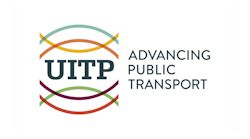UITP's Calvet: Leading the Public Transportation Discussion Around the Globe
As a trained civil engineer with more than 30 years’ experience in various sectors of public transportation, including both metropolitan and suburban rail systems, UITP ( International Association of Public Transport) President Pere Calvet came to the role with a great deal of understanding about global public transportation.
Since 2011, Calvet has been the general manager of Ferrocarrils de la Generalitat de Catalunya (FGC) in Spain, a railway company that operates several lines in Catalonia, including metro and commuter lines in and around Barcelona; tourist mountain railways; and rural rail lines. Last year they moved more than 84 million passengers, a 3.6 percent increase from the previous year.
From 2008 to 2011 he was the general manager of the company that designed Barcelona’s Line 9 metro project, one of Europe’s most significant automated metro initiatives, and that company is now the owner of the infrastructure.
“I’m very much interested in the engineering side of public transport,” Calvet said via a statement. “and traveling the world on behalf of UITP allows me to see many sectoral advancements and infrastructure developments.
UITP is a global network that brings together more than 1,500 member companies and 18,000 contact members to work together to enhance the quality of life and economic well-being by supporting and promoting sustainable transportation in urban areas worldwide. It is aware of the must current international developments with its presence in 96 countries and 16 regional offices around the world.
“UITP’s membership offers participation in a wide variety of highly technical committees and commissions, where peer-to peer exchanges take place, not to mention our world-class Centre for Training,” said Calvet. “These committees have a powerful and varied work agenda and produce relevant technical reports via the input from our members.”
Calvet stressed that UITP’s goal is to be of practical service to its members and that means being at the forefront of trends impacting public transportation and providing the latest, relevant information and resources.
One development having people talking, he said, is digitalization. He said, “People are always interested in access and development and we have many new mobility players entering the sector.”
In response, he said, this year UITP held its IT-TRANS Conference and Exhibition where many notable figures from across the industry gathered to debate digitalization, AI, cybersecurity and many more topical points. And in July, the UITP International Rail Conference and SITCE discussed digitalization in the rail sector.
“The important point to make,” he said, “is all developments in public transport can be exciting but traditional modes will always remain the backbone of urban mobility.
“Public transport should always evolve to meet the needs of each city. Regardless of what the latest trend may be, moving citizens around their city is what public transport should always be there for. It should exist to move people around in the best way possible. Public transport has indeed changed a lot in the past decade or so and we must make sure that the infrastructure is there to maintain increased use. We need to work with policy makers, mayors, ministers, operators and authorities. There needs to be economical and political backing for public transport to continue to develop.”
The International Perspective in North America
Calvet said the UITP North America Region is expanding with more members coming onboard. UITP’s most recent Global Public Transport Summit, held in Montreal, Canada, in 2017, was a great success with 2,500 participants from 84 countries around the world to exchange best practices with international experts and meet with the 330 companies from 30 countries displaying their latest innovative products and solutions.
The summit, with the theme “Lead the TRANSITion,” attracted 13,000 visitors over the three days and served the need for public transportation to take the lead faced with the numerous changes and challenges, such as digitalization, advances in green energy and the emergence of new players on the mobility market.
“It was a huge success,” Calvet said. “and I’m positive that the next edition of our summit in Stockholm will be just as successful, if not more, as UITP hopes to continue building on previous successes.”
He said, “What is obvious is there’s an increasing awareness of the importance for global best practice exchanges and general information sharing. With growing membership in the North America region, our events become even more relevant.”
October 10-12, the third annual UITP International Rail Forum will be hosted by the Los Angeles County Metropolitan Transportation Authority, an active and valued UITP member. He said the program will recognize the importance of new mobility technologies with many of the upstart, innovative and enterprising companies located on the West Coast and in the Silicon Valley.
Calvet said, “I think that the people will be interested in seeing the traditional transit industry adapting to work cooperatively and efficiently with such entities to serve modern societal urban transportation needs.”



